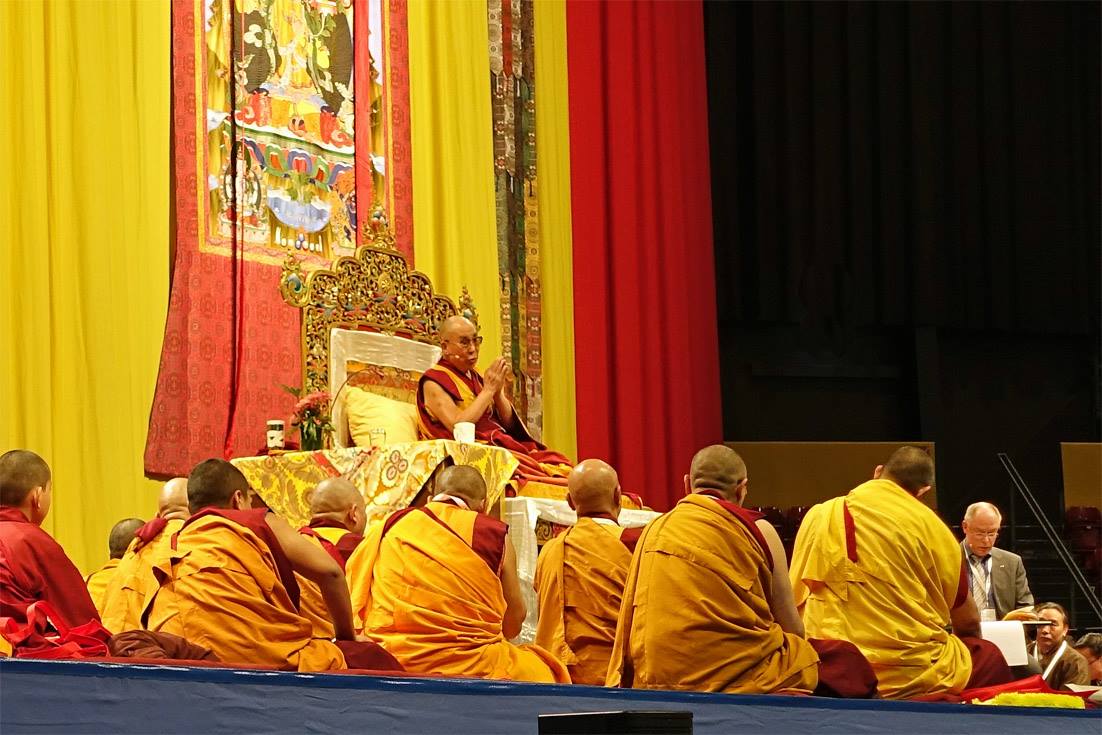
His Holiness the Dalai Lama: All the philosophy have the same purpose: to strengthen conviction about moral principles.
Second part of His Holiness the Dalai Lama’s teachings based on Nagarjuna’s Commentary on Bodhichitta (Bodhichittavivarana) and Geshe Langri Thangpa’s Eight Verses of Training the Mind in Basel, Switzerland, February 7-8, 2015. Translated from Tibetan into English by Mr Tenzin Tsepag. Trascript and notes by Dr. Luciano Villa, first revision and editing by Eng. Alessandro Tenzin Villa within the project “Free Dalai Lama’s Teachings” for the benefit of all sentient beings. We apologize for any possible errors and omissions.
His Holiness the Dalai Lama
In regard to religion tradition, most of the religious tradition are based on faith without doing very much critical analysis and investigation within the teachings.
For Buddhist is very important to develop a faith understanding the Buddha’s teachings. So we need not only to keep faith, but we need to examine also the Buddha’s teachings.
What is the benefit of teaching? So, why the teachings was taught? It’s not only because my lama has taught to me. We need to have a speculation to understand why the teaching was taught.
So we don’t need to keep blind faith, but to analyze the Buddha teachings.
And therefore we should investigate and analyze with an unbiased and inquisitive mind. And so, when you raise question you should not have any bias, no attachment and anger for any tradition but you should have an unbiased, impartial mind. Se we should be unbiased, impartial, stay in the middle.
As Aryadeva said: “You will never attain peace with a biased mind”. So you need an impartial mind, so you need to investigate with an unbiased and skeptical mind. If you are attached to a tradition you will never do so much investigation. Without a skeptical mind you will never properly speculate. Without or skepticism you will not doubt, without doubt you will not be able to investigate properly. And without being able to investigate properly you will not be able to investigate and understand the reality. See the quality of teaching trough reason and not with a blind faith. For example, when you read some Mādhyamika texts you should be able to see how profound they are and how they are supported by understanding. So you will see the quality of teachings through reason and not through blind faith. We have only two days, which is very short, to explain the Dharma.
In Nagarjuna’s text, Bodhicitta Vivarana “A Commentary on the Awakening Mind”, joust at the beginning you have very challenging thing, which are quite difficult point and you must not be discouraged by the difficulty, but you should have the courage of studying.
Master Nagarjuna lived around 2nd century where you can find in his Mādhyamika works the concept of modern physic, and in Hearth Sutra you can find that everything in the universe is empty of its own nature.
Regarding the Quantum Physic, is rather new what was discovered in the 20° century, but in Nagarjuna texts (Nagarjuna lived in 2nd century a.D.) and in the Madiamika point of view we can find concepts of Quantum Physic. Also in the Paramita (The Perfection of Wisdom) teachings and in the Hearth Sutra you find mentioned that the form is empty, which can be applied to ourselves, and so everything is empty in the universe in also empty. And so this kind of investigation should come trough reasoning.
Nagarjuna says “All the Buddha teaching are based on the two truths: the conventional and the ultimate”. Chandrakirti’s Madyamikavatara entering in says: “relying on the two wings of the bird as one, the conventional and ultimate reality, may fully grown the Bodhisattva the other shore. Understanding the conventional, that it’s an appearance, and the ultimate is as things are and so understanding the Two Truth, you understand the Four Noble Truths”.
Aryadeva, in his “400 Verses, said: “Those who speculate on the teaching of the Buddha: to them emptiness should be taught”.
With regards to religion of the world, there are three aspects. First is the religious, then philosophical and cultural. Regarding the religious aspect, all the religion talks about love. Effectively you need the practice of love, tolerance, forgiveness and patience.
Theistic and non theistic religions are very different, particularly in non theistic religion, even in Buddhism there are differences, that’s good. Moore different philosophy view are
more helpful as our intelligence becomes more active. Joust one philosopher is too less.
create feel that you can use, love. The previous pope, the German pope, said : “You should have faith and reason going together”. Wonderful!
All the philosophy have the same purpose: to strengthen conviction about moral principles.
Teachers like Buddha Sakyamuni, Jain Mahavira, Jesus Christ, Prophet Mohamed they start new teaching was influenced by previous existing culture, including temperature.
Therefore we should look at any aspect: cultural, social, philosophical.